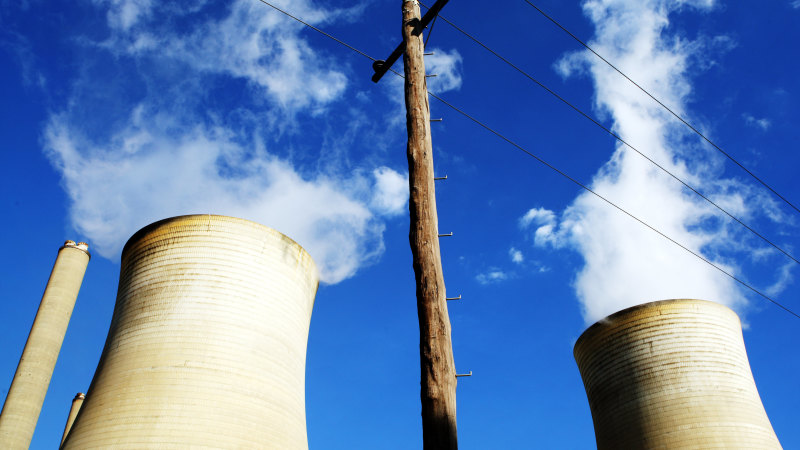Save articles for later
Add articles to your saved list and come back to them any time.
Australia will lose its triple-A credit rating by the end of the decade, driving up the federal government’s interest bill and the cost of borrowing for major companies as climate change undermines the economy and tax base.
Ground-breaking research suggests Australia is likely to be one of the worst-affected countries as taxpayers worldwide face paying more than $US1 trillion ($1.6 trillion) a year in extra interest on government debt if global temperatures climb unabated.
World-first research shows that if climate change is not slowed, Australia could lose its triple-A credit rating by the end of the decade.Credit: Janie Barrett
While there have been previous estimates of the broad economic impact of climate change, the research paper “Rising Temperatures, Falling Ratings: The Effect of Climate Change on Sovereign Creditworthiness” is the first to look at its impact on government credit ratings.
Researchers from the universities of Oxford, Cambridge, Yale and East Anglia looked at how credit ratings – used by investors to determine the ability of a country to repay its debt – would change if global temperatures increase by either two degrees or five degrees over the rest of this century.
Two of the authors, Matt Burke and Patrycja Klusak, told this masthead that Australia’s federal taxpayers and businesses would be among the worst affected by a credit rating downgrade caused by climate change.
“Regardless of whether we are talking about sticking to two degree warming scenario in line with the Paris Agreement or continuing on a current trend of 5 degree warming by 2030, Australia will be amongst 20 most hit nations,” they said.
“Under the low emissions scenario, that is consistent with limiting warming to well below two degrees, as soon as 2030 climate change will have a significant impact on Australia’s sovereign ratings. The country will be stripped out of its AAA status.”
The researchers estimated that if the global temperature increase is kept to two degrees, the loss of its triple-A credit status would cost the government between $US240 million and $US360 million a year in higher interest repayments by the end of the century.
The interest bill on corporate debt, as it is closely linked to movements in the government’s credit rating, would increase by between $US80 million and $US140 million a year.
But many scientists believe the world will be unable to hit the Paris Agreement’s target.
The researchers estimate that if the world endures a five-degree increase, Australia’s credit rating would slump to its lowest level on record. Globally, the interest bill by the year 2100 could rise to between $US1 trillion and $US1.6 trillion a year.
Australia’s business sector would not be spared, with interest costs climbing by between $US360 million and $US630 million annually.
Australia’s credit rating hit would be matched or exceeded by only a small number of countries, including Indonesia, China, India, Peru and Colombia.
Globally, the researchers estimate a two-degree increase in temperatures will lead to an increase in annual interest on government debt of between $US45 billion and $US67 billion. If temperatures increase by five degrees, the interest bill climbs to between $US135 billion and $US203 billion.
Interest on corporate debt would increase by between $US10 billion and $US61 billion.
Treasurer Jim Chalmers will this week release the latest intergenerational report, which will contain forecasts on the state of the budget, economy and population out to the 2060s.
Chalmers said the report would make clear that climate change would be one of the biggest challenges, and opportunities, for the country over the coming 40 years.
“We know higher temperatures will impact our nation, our economy and our budget, which is why our government is taking action,” he said.
“This is a defining decade for Australia and the energy transformation – getting our budget in better nick and investing in a more productive and resilient economy will be critical to our future prosperity.”
Erwin Jackson, policy director with the Investor Group on Climate Change, said the research confirmed that the nation’s finances would be undermined by climate change unless more was done to drive down greenhouse gas emissions.
He said the best way governments could limit the impact on their credit worthiness would be to put in place policies to accelerate private-sector investment in ways to reduce climate change.
“Climate damage is going to hit Australia’s balance sheet, and just like a company, if there are lots of expenses coming, that can affect credit worthiness,” he said.
“Investors have long recognised that climate change is a systemic economic and financial risk to the Australian economy. Recent climate change fuelled impacts on insurance costs, food prices and damage to infrastructure, supply chains and communities have only made this realisation sharper.”
Last year, S&P Global Ratings – one of the world’s three major rating agencies – examined the vulnerability and readiness of 135 countries, including Australia, to climate change.
It found that by 2050, up to 4.5 per cent of world GDP could be lost due to climate change, while also noting that climate risks were likely to become more important to its sovereign rating analysis.
Cut through the noise of federal politics with news, views and expert analysis from Jacqueline Maley. Subscribers can sign up to our weekly Inside Politics newsletter here.
Most Viewed in Politics
From our partners
Source: Read Full Article

